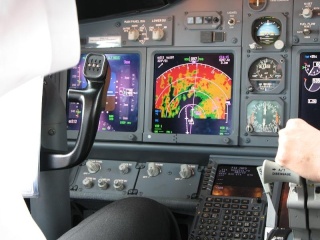For airlines that normally depend on analyzing the basics of aircraft economics and market dynamics in assessing routes and strategies, a shortage of qualified pilots has provided a rude awakening to changes well outside the usual trade lanes. In Asia, where countries have seen an upheaval in trading patterns in recent years, finding pilots has emerged as one of the toughest issues for start-ups as well as incumbent airlines.
Marsha Bell, vice president of marketing of Alteon Training, the commercial training arm of Boeing, pointed to the growth rate of aviation in China, which basically sees a doubling of the commercial jet aircraft fleet in three years. Freighter operators in the region are helping feed that demand.
"China needs on average 2,500 pilots a year over the next 20 years," she said.
According to the Civil Aviation Administration of China, the country will need over 9,000 more pilots by 2010 to handle the controls of the new Boeing and Airbus planes that are entering the Chinese fleet at a rate of 150 a year.
China's flight schools cannot keep up with this pace. Last September, the CAAC warned they could only train 7,000 pilots until 2010, leaving a shortfall of 2,000.
Having an open regulatory environment that allows the recruitment of expatriate flight crews can be a big advantage for an airline, according to Ram Menen, executive vice president of cargo of Emirates Airlines. "We can recruit pilots from any nationality. In the EU, you need EU nationals," he said.
Emirates and other Middle Eastern airlines have been accused of aggressively recruiting pilots from other countries, but they are not the only ones that are looking far and wide for flight crews. Korean Air has expedition teams that regularly visit the United States and some other countries, such as Brazil. Indian carriers have also been eager to sign up experienced pilots from North America.
Indeed, the pilot shortage has become a global issue; it is just more pronounced in Asia, thanks to China's rapid growth in aviation, she said. According to IATA, about 17,000 pilots are going to be needed every year in the next 18 years to match the projected growth in the world jet aircraft fleet of some 19,000 new planes until 2025.
The situation is in danger of turning dire soon in Australia, according to Regional Express, the country's largest regional carrier. By its estimates, the country needs an additional 1,800 pilots over the coming two years but will probably train less than half of that.
IATA favors the raising of the retirement roof to 65, but argues this is not enough to prevent a serious shortage in the coming years.
The airline body has been pushing for a new approach to pilot training, notably the multi-crew pilot licensing training program the International Civil Aviation Organization endorsed in 2006. This concept is more aircraft-focused and simulator-based, as opposed to the traditional approach, which emphasizes actual flying and prepares a pilot for solo flying.
Changing training parameters and boosting capacities must be met with a drive to entice young people to want to become pilots.
Arguably this could be tougher for all-cargo carriers, with their flights at odd hours and destinations as likely to include industrial zones as the more familiar gateways. "Passenger airlines tend to pay more and offer better lifestyles, so cargo is feeling the squeeze more," said Ron Mathison, general manager and director of cargo at Cathay Pacific.
Most airline executives are at pains to deflect suggestions that cargo could be hurt more than passenger operations. "There will be a lot of demand for passenger pilots, but I don't think it will put pressure on us. Some pilots like to fly for cargo airlines, because no day is the same," said Menen.
Ken Choi, who retired from the helm of Korean Air Cargo at the end of last year, said in November the world's largest international cargo carrier occasionally had to wet-lease freighters due to limitations on cockpit crews even though it had aircraft available.
In any case, the situation is unlikely to get easier in the near term and there is widespread agreement that carriers and their customers are seeing only the start of a longer-term phenomena. "I think the pilot shortage will really bite in 2010," Menen said.
03/03/08 Ian Putzger/aircargoworld, DC, USA
